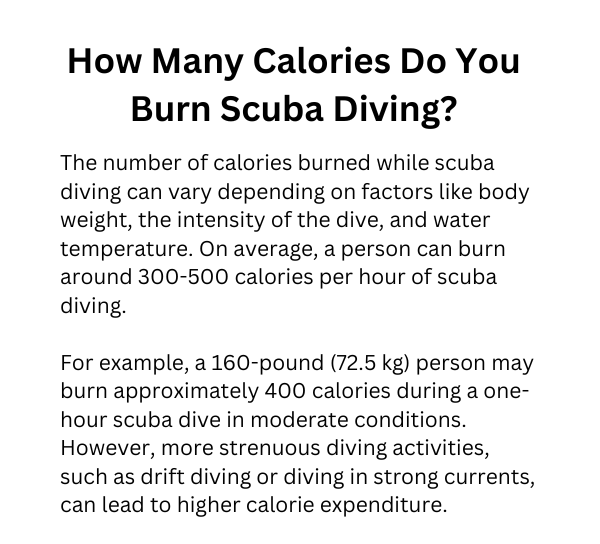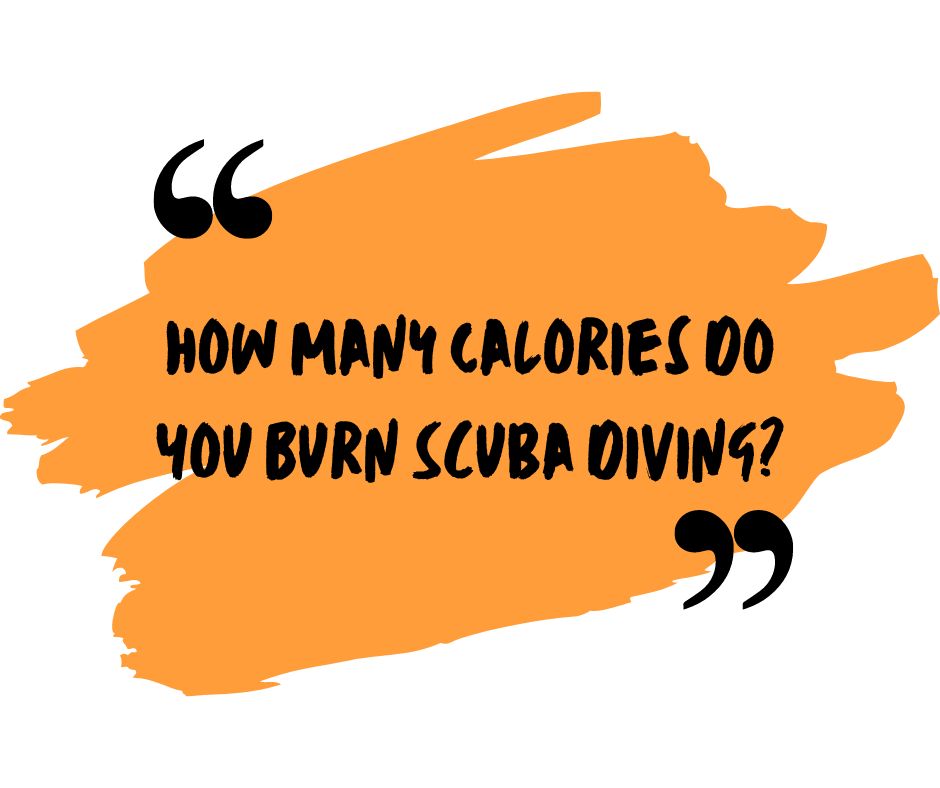The number of calories burned while scuba diving can vary depending on factors like body weight, the intensity of the dive, and water temperature. On average, a person can burn around 300-500 calories per hour of scuba diving.
Scuba diving is not only an exciting and immersive underwater adventure but also a physically engaging activity. While divers often focus on the wonders of the deep, it’s natural to wonder about the fitness and calorie-burning aspects of scuba diving. In this article, we will delve into the world of calories and scuba diving, exploring the factors that influence calorie expenditure and how this water sport can contribute to a healthy lifestyle.
The Calorie-Burning Factors of Scuba Diving
Resistance and Buoyancy
Scuba diving offers a unique environment where water resistance and buoyancy play a significant role in calorie expenditure. Here’s how these factors affect the calorie-burning process:
- Water Resistance: Moving through water requires more effort than moving through air. Water resistance provides resistance to every motion, making diving a full-body workout.
- Buoyancy Control: Maintaining neutral buoyancy is an essential skill for divers. This constant adjustment of buoyancy adds an element of core engagement and muscle work, further increasing calorie burn.
Duration and Depth
The duration and depth of your dive can significantly influence calorie expenditure. Longer dives and deeper descents require more energy, resulting in a higher calorie burn. Exploring deep dive sites or spending extended periods underwater can make scuba diving an excellent calorie-burning activity.
Gear and Equipment
Wearing scuba gear, such as a wetsuit, BCD (buoyancy control device), and tanks, adds to the physical demand of diving. The extra weight and bulk of equipment require divers to use more energy and engage different muscle groups, contributing to calorie expenditure.
Calorie Expenditure Estimates
Estimating the exact number of calories burned during scuba diving can be challenging, as it depends on various factors, including a diver’s weight, dive conditions, and the specific type of diving. On average, a leisurely scuba dive can burn anywhere from 300 to 500 calories per hour. However, more strenuous dives or longer durations can lead to even higher calorie expenditures.
The Health Benefits of Scuba Diving
While scuba diving may not be a primary exercise for weight loss, it offers several health benefits:
- Cardiovascular Health: The increased heart rate and deeper breathing during dives can improve cardiovascular fitness.
- Muscle Strength: Diving engages the legs, arms, and core muscles, promoting strength and endurance.
- Mental Health: The relaxation and stress reduction from being submerged in water can positively impact mental well-being.
- Low Impact: Scuba diving is a low-impact sport, making it suitable for people with joint issues or those seeking an alternative to high-impact exercises.

FAQ
Can scuba diving be part of a weight loss regimen?
While scuba diving is not primarily a weight loss activity, it can be a fun way to burn calories and maintain a healthy lifestyle. Incorporating regular diving into an overall fitness plan can contribute to weight management.
Does the type of dive influence calorie expenditure?
Yes, the type of dive can influence calorie expenditure. More challenging dives, such as drift diving, night diving, or deep diving, tend to require more energy and burn additional calories.
Is scuba diving suitable for people of all fitness levels?
Scuba diving can be enjoyed by individuals of various fitness levels, as long as they are physically fit and have no medical conditions that contraindicate diving. It’s essential to consult with a physician and complete dive training to ensure safe participation.
In conclusion, scuba diving offers an engaging and unique way to burn calories and stay active. While it may not be a primary weight loss activity, the combination of water resistance, buoyancy control, and gear usage makes it an excellent way to maintain or improve fitness levels while enjoying the underwater world. Plus, the mental and physical health benefits of scuba diving make it an attractive option for those seeking a well-rounded and enjoyable exercise.
